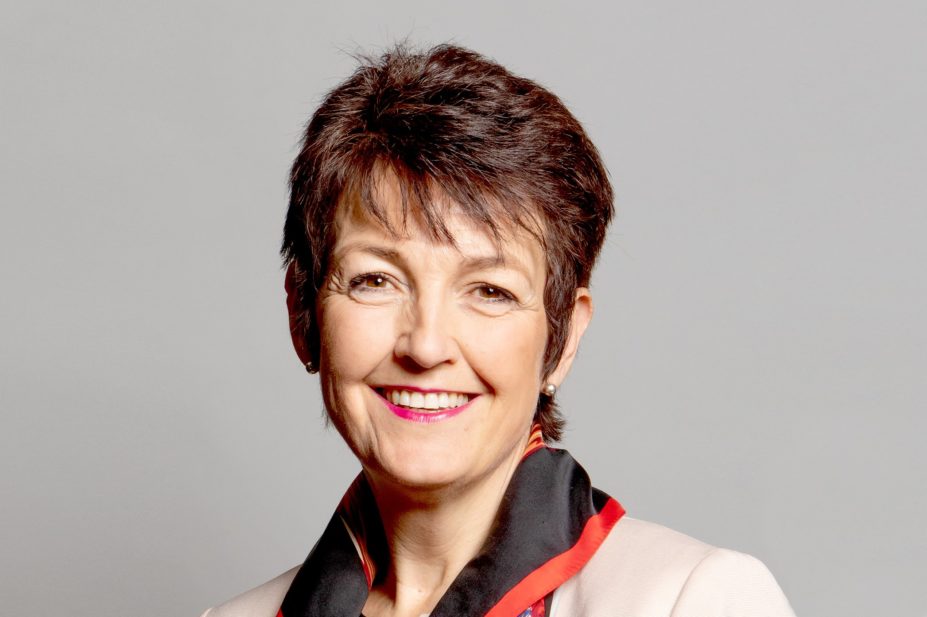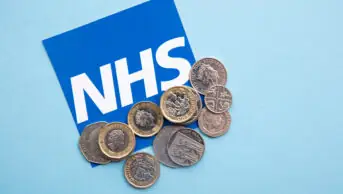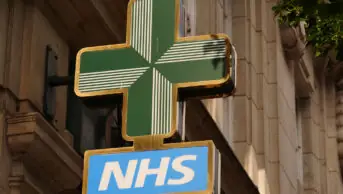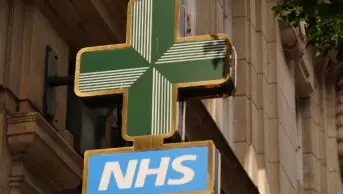
UK Parliament
Open access article
The Royal Pharmaceutical Society has made this article free to access in order to help healthcare professionals stay informed about an issue of national importance.
To learn more about coronavirus, please visit: https://www.rpharms.com/resources/pharmacy-guides/wuhan-novel-coronavirus
Jo Churchill may be the government minister responsible for primary care in England, but she is not immune to the difficulties of working from home that many have experienced during the COVID-19 pandemic.
“I am on the phone,” she shouts to her children in the middle of our interview, conducted over Zoom with her laptop balanced on a drawer. However, from her makeshift home office in Suffolk, Churchill has been playing a pivotal role in the response of primary care to the crisis.
She currently chairs an out-of-hospital stakeholder group, which brings together representatives from the pharmacy, general practice, dentistry and community nursing professions to inform government directly about problems on the ground every week.
It is clear that this group has kept Churchill well informed about the unprecedented rise in workload that community pharmacy has experienced since the pandemic began, with a 300% increase in delivieries and dispensing activity up by a third. She has played a role in ensuring that the sector has received advance payments totalling £350m to help cope with cash flow problems and an additional £15m for generic medicines reimbursement in June 2020.
However, the government has made a several unforced errors with regards to community pharmacy: for example, missing out the third largest healthcare profession from a list of key workers in March 2020 and a decision (later reversed) to exclude community pharmacy — in most cases — from a life assurance scheme that pays £60,000 to the families of frontline workers who have died from COVID-19.
Despite this, Churchill is keen to stress that she has been “robust” in representing the sector within government, even to the point that the secretary of state for health and social care knew what she was going to say.
What is your assessment of how the pharmacy sector is coping with COVID-19?
When people didn’t know where to go and everything in the high street started shutting down, there was still the pharmacy
They have been outstanding. They’ve never shut their doors or stopped serving their communities. When people didn’t know where to go and everything in the high street started shutting down, there was still the pharmacy — a bit like the supermarket — just carrying on in the most unbelievably dignified way. “Thank you” sounds trite, but, for me, it was incredibly moving. I’ve started to refer to community pharmacy as my ‘NHS-plus’ because the NHS wouldn’t function without it. It’s vital.
Does it make you proud as the pharmacy minister?
Yes, hugely. Very early on, a pharmacist said to me that one of the big problems with social distancing was that she was having people come into the pharmacy to chat and pick their prescription up, and now she had to find a way to move them on. And then, very rapidly, many older people were shielded or placed on the clinically vulnerable list. With very little noise and complete professionalism, pharmacy turned around and is delivering to all those people.
Ensuring the wellbeing of pharmacy staff has been paramount
The increase in workload for community pharmacy during the pandemic has caused a lot of strain. Has the case been made for a permanent wellbeing service to support the sector?
Ensuring the wellbeing of pharmacy staff has been paramount. Giving them access to “Every Mind Matters”, the mental health line, was particularly important. These are some of the things after COVID-19 that we need to have conversations about, because it was quite glaring. GPs said: “We have our own helpline” and it was pointed out by Ravi Sharma, director for England at the Royal Pharmaceutical Society (RPS), I think, that pharmacy is backed by a small charity helpline.
A helpline is very different from the kind of confidential counselling that GPs have.
There has also been access to coaching since 24 April 2020. And we’ve had something in the region of 570 completed sessions.
So you will be looking at a permanent service?
As we come out of these times, it’s part of the conversation as to how we look after people and maintain people’s physical and mental health. People are tired; it’s evident from some of the letters that I’ve had from pharmacists explaining what their daily workload has been like. It’s important that we look at new systems of working and what we can bin, what nobody has missed and what positives we’ve got.
GP surgeries have been promised a COVID-19 support fund to cover their extra staff and non-staff costs during the pandemic. Can you guarantee pharmacists the same treatment?
Conversations about funding for GPs are ongoing and I am also having very forceful conversations with Her Majesty’s Treasury. I can’t guarantee anything; all I can say is that we did secure the £350m extra funding to assist cash flow. But I’m mindful that that was just for cash flow.
It wasn’t exactly “extra”, was it?
No. It was to enable business to go on without as much worry as the funding not being there. And, with all due respect, the generic reimbursement increased by £15 million from 1 June 2020 again, to try to make sure that losses aren’t incurred for the work that has been done, which is right and appropriate. Working with the Pharmaceutical Services Negotiating Committee (PSNC) to understand the figures and all the data and information available, we have built the case.
Some pharmacists have said they feel forgotten during the pandemic. The approach to supporting professions feels very different between general practice, where they’ve been promised a support fund, and pharmacy, where you’re saying there’s no guarantee.
I think the case we have made for pharmacy is very strong and is backed up by robust data
The system is the same across primary care, whether it’s GPs, pharmacists, dentists or care home workers. We have to approach the Treasury with a sound business case for what we want. And I think the case we have made for pharmacy is very strong and is backed up by robust data. I have been forceful and robust in the fact that pharmacists have gone above and beyond.
So you are hopeful?
I would like to hope, yes. The government has certainly recognised this. For example, over the Easter bank holidays, it was the government that funded those additional pharmacy opening hours. Over 10,500 opened their doors and they were well-used. Pharmacies have had absences and they have had additional workload — I’m very mindful of those things.
But pharmacy teams were left out of the life assurance scheme, after not being specifically named as key workers. Do you regret some of the decisions that have been made during the pandemic relating to community pharmacy?
Registered pharmacists need to be able to show their registration card and be a key worker
Sometimes how these things are portrayed is not how they are. I sought clarification, and it was laid out on 20 May 2020, that awards can be made not only to community pharmacists, but to pharmacy technicians, dispensing assistants and medicines counter assistants. It’s one of those awful things that you hope never has to be taken up, but we have had six people who have been working in community pharmacy that have passed— making sure they have been covered is hugely important. From the very get-go, I have been clear in my determination to show that pharmacy is part of the way we were going to deliver this scheme. It is challenging, because it isn’t part of the actual body of the NHS. And I think it’s one of the lessons to learn. Registered pharmacists need to be able to show their registration card and be a key worker. One of the things I’ve been mulling over is: “Is there a need for a ‘NHS plus’ card?”
How do you see pharmacy services changing as a result of the pandemic?
For the medium term, we still have challenges. But teams and stakeholder groups are now beginning to split off and look at recovery. One of the key things that pharmacists, the PSNC and the RPS have said to me is that there have been some good things that have come from this, and that they don’t want to lose them: such as looking at summary care records; potentially opening up video consultations; and the rollout of electronic prescribing services. These are things that have happened at breakneck speed that probably would have taken forever otherwise. I don’t want to imply that we welcome what has happened, but we will try and seize the opportunity and have a very robust conversation about what pharmacists never want to see reintroduced.
Can you give any examples of this?
Certain parts around the regulatory framework, and that sort of thing. People need to tell me and then I can make sure that within the department we’ve looked at whether that is — on a regulatory basis — doable.
Are you looking at revising any of the clinical services in the new contract? Could they be changed?
We are having that conversation because we just embarked on a new contract. We’re also going to be looking at flu vaccination and safe methods of delivery. Prioritising and planning for the new medicine service, medicines use reviews —which are due to be phased out in 2020/2021 — and the community consultation services will all be in there, as will the introduction of agreed new services like the discharge service and hepatitis C. What I hoped to do when I took on this role is to think about patient benefit the whole time. Now, sometimes the pharmacist is the best person to deliver that patient benefit and we need other professions to really see the value of that. We’ll look at re-establishing pilot programmes and evaluating the current pilot programmes to support the continued transformation to a more service-based contract.
So we may see some more changes to the framework at some point?
You are putting words into my mouth there. No. What I’m actually saying is: I want to move that framework forward. But I want to do this at a pace that recognises the effort and contribution that has gone in.
Do you see room for antibody testing for COVID-19 in pharmacies?
I would like to see the highly skilled individuals that sit in pharmacies used to the best of their advantage
Again, it’s part of that conversation. I would like to see the highly skilled individuals that sit in pharmacies used to the best of their advantage. They are highly trained and they understand infection control. My caveat, if I’m honest, is the variation and not overwhelming the small independents against the large multiples. We’re going to have to continue, for example, shielding people and if we see a slight rise in the R number and have a very heavy winter flu, I am mindful that we don’t heap yet more ask on. We take on board what has been good, evaluate what has worked and help get rid of those things that have become an annoyance. And then we move forward with some of these huge positives. It took me a couple of weeks, but I got pharmacy name-checked at the pressers. I got them listed as key workers. Literally, Matt Hancock went to me: “Yeah, I know. Pharmacy.” You know you have landed it then. I know that he always did see pharmacy as a hugely important part of the overall service, so don’t think you’re forgotten.


